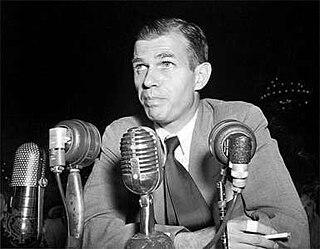Related Research Articles

Alger Hiss was an American government official accused in 1948 of having spied for the Soviet Union in the 1930s. Statutes of limitations had expired for espionage, but he was convicted of perjury in connection with this charge in 1950. Before the trial Hiss was involved in the establishment of the United Nations, both as a U.S. State Department official and as a U.N. official. In later life, he worked as a lecturer and author.
The Venona project was a United States counterintelligence program initiated during World War II by the United States Army's Signal Intelligence Service and later absorbed by the National Security Agency (NSA), that ran from February 1, 1943, until October 1, 1980. It was intended to decrypt messages transmitted by the intelligence agencies of the Soviet Union. Initiated when the Soviet Union was an ally of the US, the program continued during the Cold War, when the Soviet Union was considered an enemy.

Isidor Feinstein "I. F." Stone was an American investigative journalist, writer, and author.

Jack Soble was a Lithuanian who, together with his brother Robert Soblen, penetrated Leon Trotsky's entourage for Soviet intelligence in the 1920s. Later, in the United States, he was jailed, with his wife Myra, on espionage charges. He was born in Vilkaviskis, Lithuania as Abromas Sobolevicius and sometimes used the name Abraham Sobolevicius or Adolph Senin.
Solomon Adler worked as U.S. Treasury representative in China during World War II.
William Perl (1920–1970), whose original name was William Mutterperl, was an American physicist and Soviet spy.
Philip Olin Keeney (1891–1962), and his wife, Mary Jane Keeney, were librarians who became part of the Silvermaster spy ring in the 1940s.
Maria Wicher was married to Professor Enos Wicher and was the mother of Flora Wovschin. The family were all spies for the Soviet Union during the 1940s. Maria had previously been married to Dr. William A. Wovschin, Flora's father. Her code name in Soviet intelligence and in the Venona project is "Dasha".
Jack Bradley Fahy (1908–1947) was an American government official. He allegedly spied for the Soviet Naval GRU during World War II. Soviet naval intelligence was much smaller than the Soviet army's GRU, and only a fraction of the size of the KGB.

Iskhak Abdulovich Akhmerov (1901–1976) was a highly decorated OGPU/NKVD (KGB) Soviet security officer, best known to historians for his role in KGB operations in the United States 1942–1945. His name appears in the Venona decryptions over fifty times, often as signatory, and on his return to the Soviet Union in 1945/46, he rose to deputy chief of the KGB's 'illegal' intelligence section.
Harvey Elliott Klehr is a professor of politics and history at Emory University. Klehr is known for his books on the subject of the American Communist movement, and on Soviet espionage in America.
John Earl Haynes is an American historian who worked as a specialist in 20th-century political history in the Manuscript Division of the Library of Congress. He is known for his books on the subject of the American Communist and anti-Communist movements, and on Soviet espionage in America.
Marietta Voge, née Mariette Jirku was a noted parasitologist, author and educator at the University of California, Berkeley.
Anatoly Veniaminovich Gorsky, was a Soviet spy who, under cover as First Secretary "Anatoly Borisovich Gromov" of the Soviet Embassy in Washington, was secretly rezident in the United States at the end of World War II.
Max Holland is an American journalist, author, and the editor of Washington Decoded, an internet newsletter on US history that began publishing March 11, 2007. He is currently a contributing editor to The Nation and The Wilson Quarterly, and sits on the editorial advisory board of the International Journal of Intelligence and CounterIntelligence. As of 2004 he had more than two decades of journalism experience; his articles have appeared in The Atlantic Monthly, American Heritage, The Washington Post, The New York Times, Los Angeles Times, The Boston Globe, The Baltimore Sun, Studies in Intelligence, the Journal of Cold War Studies, Reviews in American History, and online at History News Network.
Engelbert Broda was an Austrian chemist and physicist suspected by some to have been a KGB spy code-named Eric, who could have been a main Soviet source of information on British and American nuclear research.

David Aden Salmon was a career government functionary in the U.S. Department of War and the U.S. Department of State. In 1931, Salmon rose to head the State Department's Bureau of Indexes and Archives, a department with over 150 employees at the time. In 2008 Cold War historian John Earl Haynes identified Salmon as "Willy", a codename for a Soviet agent, followed by a 2009 book which argued that Salmon was, from 1934 until early 1937, a paid source of classified diplomatic and military information which ended in the hands of Soviet intelligence. This identification has been challenged by at least one historian specializing in espionage history.

John Lowenthal (1925-2003) was a 20th-century American lawyer, civil servant, law professor, and documentary filmmaker, who defended the name and reputation of family friend Alger Hiss almost all his life.
References
- ↑ " "Unmasking the Other Deep Throat". Washingtonian . November 4, 2009.
- ↑ Politics and the English Language,